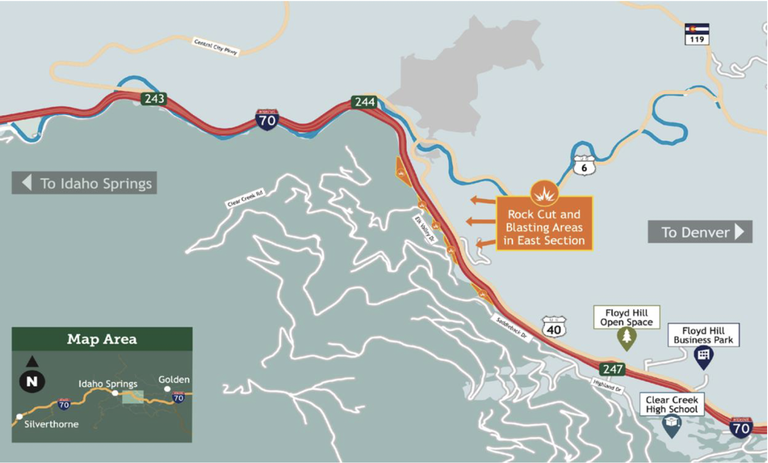Rock scaling and blasting begins on the I-70 Floyd Hill Project
Project Update
Clear Creek County — Starting July 31, the Colorado Department of Transportation and contractor partner, Kraemer North America, will begin rock scaling operations as part of the I-70 Floyd Hill Project. This work will take place ahead of rock blasting activities, which are scheduled to begin in August 2023. Rock scaling and blasting will take place in the East Section of the Project, along eastbound I-70 between the US 6 interchange and Hyland Drive (MP 247). It will allow crews to widen eastbound I-70 to build an extended on-ramp from the US 6 interchange to the top of Floyd Hill.
Rock Scaling Traffic Impacts
Crews will conduct rock scaling operations, which is the process of removing loose and unstable material from the rock blasting area, beginning the week of July 31. Operations will last approximately two weeks. Rock scaling will occur up to four times daily, Monday through Thursday, from 9 a.m. to 3 p.m. during off-peak travel times. Motorists can expect traffic holds up to 20 minutes long on both directions of I-70, and delays up to 45 minutes as the traffic queues clear. Eastbound I-70 traffic will be stopped at the Hidden Valley/Central City interchange (Exit 243). Westbound I-70 traffic will be stopped near County Road 65 (Exit 248).
Rock Blasting Traffic Impacts
When rock scaling work is complete, crews will begin rock blasting activities. Rock blasting is the process of drilling holes in a rock mass and allowing an explosive to fracture the rock. Rock blasting will occur once per day and up to two times per week, Monday through Thursday, from 9 a.m. to 3 p.m., and Fridays, from 9 a.m. to noon. There will be an estimated 30 blasts in the East Section of the Project through early 2024. A series of air horn blasts will precede each detonation to warn people in the area. Text alerts will be sent out prior to rock blasting operations (and on a more frequent basis for residents within 1,000 feet of the blasting zone). For information on the blasting schedule, you can call our hotline (720-994-2368) and listen to the daily blasting schedule.
There will not be a traffic detour in place during rock scaling or blasting. The Project asks travelers to plan trips around the blasting schedule. If you have to travel during blasting operations, both directions of I-70 traffic should expect to be stopped for 20 minutes while blasting occurs. Overall, motorists can expect delays up to 45 minutes. Eastbound I-70 traffic will be stopped at the Hidden Valley/Central City interchange (Exit 243). Westbound I-70 traffic will be stopped near County Road 65 (Exit 248).
Don’t be caught by surprise! Know before you go and opt into text alerts by texting floydhill (lowercase, one word) to 21000 and sign up for project emails by visiting our website: codot.gov/projects/i70floydhill.
Please click here to see FAQs for more information.

Project Information
For additional information about this project:
- Call the project information line at 720-994-2368 (CDOT)
- Text floydhill to 21000 to sign up for text alerts
- Email the project team at: [email protected]
- Visit the project website at: codot.gov/projects/i70floydhill
Know Before You Go
Travelers are urged to “know before you go.” Gather information about weather forecasts and anticipated travel impacts and current road conditions prior to hitting the road. CDOT resources include:
- Road conditions and travel information: COtrip.org
- Download the COtrip Planner app: bit.ly/COtripapp
- Sign up for project or travel alerts: bit.ly/COnewsalerts
- See scheduled construction lane closures: bit.ly/laneclosures
- Connect with @ColoradoDOT on social media: Twitter, Facebook, Instagram and YouTube
About The Project
The I-70 Floyd Hill Project will improve eight miles of the I-70 mountain corridor, from west of Evergreen to eastern Idaho Springs. The project will deliver a third westbound I-70 travel lane, which will function as an Express Lane, to improve the current two-lane bottleneck. Other major elements include constructing a missing two-mile section of the frontage road between US 6 and the Hidden Valley/Central City Parkway interchange, building an eastbound I-70 extended on-ramp for slow-moving vehicles, improving traffic flow and access at interchanges and intersections within the project limits, improving sight distance on roadway curves, improving the Clear Creek Greenway trail, and implementing environmental mitigations to create safer wildlife movements and improve air and water quality, stream conditions and recreation. Construction began in July 2023 and is anticipated to conclude in late 2028.
